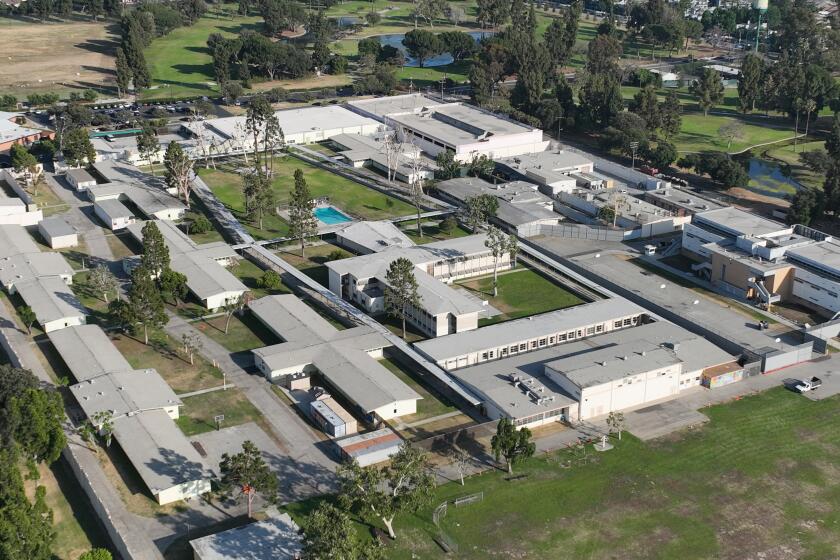High Court Decision Could Hurt Misconduct Probes, Lawyer Says
- Share via
Richard Ceballos, the Los Angeles prosecutor at the center of a U.S. Supreme Court decision limiting whistle-blower rights, said Wednesday that the high court’s ruling will dampen prosecutors’ willingness to speak out when they encounter corrupt police officers.
Ceballos, 42, who grew up in East Los Angeles and was among the first generation in his family to go to college, said he found the Supreme Court’s decision disheartening -- for his own career and for all public employees.
“I’m clearly disappointed,” he said, sitting in his office on the 18th floor of the county’s Criminal Courts Building. Ceballos still works for the district attorney’s office, though he says he is persona non grata among some of the department’s top managers.
“It strikes a blow for all government employees and creates a disincentive to report corruption, misconduct, waste and fraud that we come across in our work,” he said.
Six years ago, Ceballos filed a suit against Los Angeles County, contending that top supervisors in the district attorney’s office tolerated misconduct by sheriff’s deputies and retaliated by demoting him for writing a memo alleging that deputies may have lied to obtain a search warrant.
On Tuesday, the Supreme Court threw out much of the suit, ruling that while government employees have the same rights as other citizens to speak out on the controversies of the day, they do not have the right to speak freely inside their offices on matters related to their “official duties.”
The message, Ceballos said, is “Keep quiet. Keep your mouth shut.”
The decision could effect millions of public employees, including teachers, public hospital workers and police officers, legal experts said.
Lawyers for city and state agencies say the decision will prevent employees from making federal cases out of routine internal workplace disputes.
“He wasn’t doing it to express his opinion as a concerned citizen,” said Cindy Lee, the private lawyer hired by the county to handle the case. It was Ceballos’ job to evaluate search warrants, Lee said. He determined that the search warrant was faulty, but his supervisor disagreed.
Ceballos’ dispute arose during former Dist. Atty. Gil Garcetti’s tenure, but Ceballos’ current boss, Los Angeles County Dist. Atty. Steve Cooley, praised the ruling.
Other government agencies, including the Bush administration, joined the case on the side of county officials.
Ceballos said he is still trying to determine how much of his lawsuit will survive the ruling. On Wednesday, a colleague from the district attorney’s office took him to lunch to commiserate.
There was a moment of awkwardness when the pair realized they had been seated near top officials from the district attorney’s office, who happened to be at the same restaurant.
Such tension is routine as a result of the lawsuit, Ceballos said. Still, he is unwilling to quit.
Ceballos said he always wanted to be a prosecutor -- a job he associated with someone who “wears the white hat,” putting criminals in jail but making sure the innocent are not prosecuted.
“The job of the prosecutor is not to win every case, it’s to seek justice,” he said.
After four years at USC and earning a degree from Loyola Law School, Ceballos joined the district attorney’s office in 1989, moving up through the ranks.
By 1999, he was working in Pomona as a calendar deputy, overseeing other lawyers.
A defense attorney, Richard Escobedo, came to him with allegations that sheriff’s deputies had lied to obtain a search warrant.
The deputies said they had found a stolen, stripped pickup truck parked on the street in the unincorporated community of Bassett, near La Puente.
In their search-warrant affidavit, the deputies said they followed tire marks from the parked truck along a driveway to the suspects’ property.
Once inside, deputies, who had brought a drug-sniffing dog with them, found narcotics and arrested three suspects.
Escobedo said that the “driveway” was actually a 300-foot road, with nine houses on it, in addition to the suspects’.
Escobedo said that there was no way the deputies could have distinguished the suspects’ vehicle tracks from any of the others and asked that the search warrant -- and the evidence -- be quashed.
Ceballos agreed to look into it and said he became convinced the deputies had misled the judge.
This was around the time that the Los Angeles Police Department was embroiled in the Rampart scandal, and Ceballos said he felt it was important to take misconduct allegations seriously.
He wrote an internal memo questioning the deputies’ veracity and argued that the charges against the suspects should be dismissed because the search had been illegal.
Initially, he said, his supervisors, including Pomona Head Deputy Frank Sundstedt, were supportive, but they changed their minds after talking to sheriff’s officials.
Ceballos said he fought with his bosses over their reversal and over whether to turn a copy of the memo over to defense lawyers.
Sundstedt denied that he had covered up for wayward officers.
“What Richard wanted ... was the case dismissed,” Sundstedt, who is now retired, said in a phone interview Wednesday. But he added, “Richard was not the judge, is not the judge, and still isn’t a judge. He felt his mind was made up and, because his mind was made up, the case should go away. I disagreed.”
Ceballos was removed from the case. A redacted version of the memo eventually was turned over. Ceballos ended up testifying on behalf of the defense in a hearing on the validity of the warrant.
The judge upheld the search and the suspects were convicted.
As a result of his protests, Ceballos said he was demoted and then sent to work in the El Monte courthouse, which was farther from his home.
Ceballos filed a grievance, which was rejected. In 2000, he filed a federal civil rights lawsuit. It was thrown out by a district court, then reinstated by the U.S. 9th Circuit Court of Appeals.
Ceballos and his lawyer say they may still be able to proceed with his claim that he was retaliated against for his testimony at a hearing about the warrant, and for complaints he made about his treatment.
Lawyers for the county said they believe the federal suit is dead as a result of the Supreme Court ruling.
Ceballos said he wants to return to Pomona, to the job he had before the dispute arose. “Where do I go from here?” he said. “I don’t know.”
More to Read
Sign up for Essential California
The most important California stories and recommendations in your inbox every morning.
You may occasionally receive promotional content from the Los Angeles Times.













